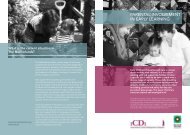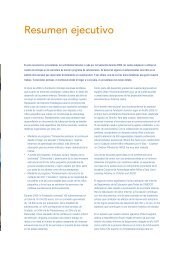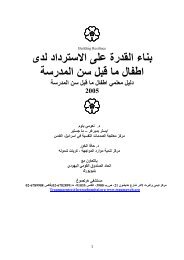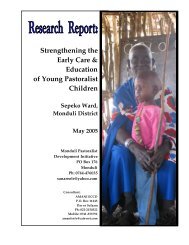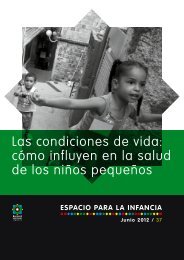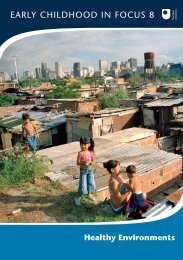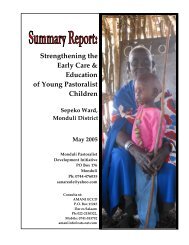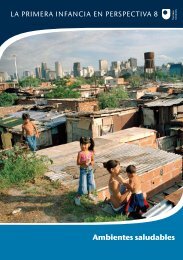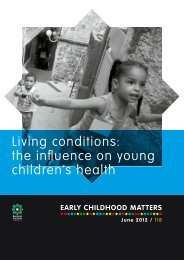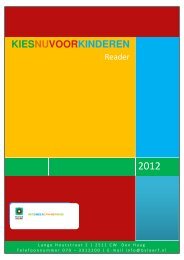Раннее деÑÑÑво и наÑалÑное обÑазование - Bernard van Leer ...
Раннее деÑÑÑво и наÑалÑное обÑазование - Bernard van Leer ...
Раннее деÑÑÑво и наÑалÑное обÑазование - Bernard van Leer ...
- No tags were found...
You also want an ePaper? Increase the reach of your titles
YUMPU automatically turns print PDFs into web optimized ePapers that Google loves.
OECD (1977) Early Childhood Care and Education: Objectives and issues, Paris, OECD Centre forEducational Research and Innovation.OECD (2001) Starting Strong: Early childhood education and care, Paris, OECD.OECD (2006a) Starting Strong II: Early childhood education and care, Paris, OECD.OECD (2006b) Education at a Glance: OECD Indicators 2006. Paris: OECDOkon, W. and Wilgocka-Okon, B. (1973) The School Readiness Project, Paris, UNESCO.Petriwskyj, A., Thorpe, K. and Tayler, C. (2005) ‘Trends in construction of transition to school inthree western regions, 1990–2004’, International Journal of Early Years Education, vol. 13, no. 1,pp. 55–69.Piketty, T. and Valdenaire, M. (2006) ‘L’impact de la taille des classes sur la réussite scolaire dansles écoles, collèges et lycées français: estimations à partir du panel primaire 1997 et du panelsecondaire 1995’ (‘Impact of class size on student success in French schools, high schoolsand colleges: primary panel 1997 and secondary panel 1995 assessments’), Paris, Ministèrede l’Éducation Nationale, de l’Enseignement Supérieur et de la Recherche, Direction del’Evaluation et de la Prospective.Programme for International Student Achievement (PISA) (2004) Learning for Tomorrow’s World –First results from PISA 2003, Paris, OECD.Rogoff, B. (1990) Apprenticeship in Thinking: Cognitive development in social context, New York, NY,Oxford University Press.Rogoff, B. (2003) The Cultural Nature Of Child Development, New York, NY, Oxford University Press.Saluja, G., Scott-Little, C., Clifford, R.M. (2000) ‘Readiness for school: a survey of state policies anddefinitions’, Early Childhood Research and Practice, vol. 2, no. 2; also available online athttp://ecrp.uiuc.edu/v2n2/saluja.html (Accessed June 2007).Samms-Vaughn, M., Williams, S. and Brown, J. (2004) Disciplinary Practices among Jamaican Parentsof Six-Year-Olds, Kingston, Jamaica, University of the West Indies.Schweinhart, L.J., Montie, J., Xiang, Z., Barnett, W.S., Belfield, C.R. and Nores, M. (2004) ‘Lifetimeeffects: the High/Scope Perry Preschool study through age 40’, Monographs of the High/ScopeEducational Research Foundation, no. 14, Ypsilanti, MI, High/Scope Press.Schweinhart, L.J. and Weikart, D.P. (1980) Young Children Grow Up: The effects of the Perry PreschoolProgram on youths through age 15, Ypsilanti, MI, High/Scope Press.Scott-Little, C., Kagan, S.L. and Stebbins Frelow, V. (2006) ‘Conceptualization of readiness and thecontent of early learning standards: the intersection of policy and research?’, Early ChildhoodResearch Quarterly, vol. 21, no. 2, pp. 153–73.Shaeffer, S. (2006) ‘Formalize the informal or “informalize” the formal: the transition from preschoolto primary’, International Institute for Educational Planning Newsletter, vol. 24, no. 1, p. 7,Paris, UNESCO, International Institute for Educational Planning (IIEP).Shonkoff, J. and Phillips, D. (eds) (2000) From Neurons to Neighborhoods: The science of early childdevelopment, Washington, DC, National Academy Press.Thomas, W. and Collier, V. (2002) A National Study of School Effectiveness for Language MinorityStudents’ Long-term Academic Achievement, Santa Cruz, CA, Center for Research on Education,Diversity and Excellence.UNESCO (1990) ‘Meeting basic learning needs’, World Declaration on Education for All, adopted bythe World Conference on Education for All, Jomtien, March 1990, New York, NY, UNESCO; alsoavailable online at http://www.unesco.org/education/efa/ed_for_all/background/jomtien_declaration.shtml (Accessed July 2007).UNESCO (2000) Dakar Framework for Action: Education for all – Meeting our collective commitments,adopted by the World Education Forum, Dakar, Senegal, 26–28 April 2000, available online athttp://www.unesco.org/education/efa/ed_for_all/dakfram_eng.shtml (accessed July 2007).UNESCO (2005) Advocacy Brief on Mother Tongue-based Teaching and Education for Girls. Bangkok,UNESCO.UNESCO (2006) Strong Foundations: Early childhood Care and Education – 2007 Education for AllGlobal Monitoring Report, Paris, UNESCO.United Nations (1989) Convention on the Rights of the Child, UN General Assembly Document A/RES/44/2, New York, NY, United Nations.United Nations Committee on the Rights of the Child (2001) The Aims of Education, GeneralComment No. 1, Geneva, Office of the UN High Commissioner for Human Rights.United Nations Committee on the Rights of the Child (2005) Implementing Child Rights in EarlyChildhood, General Comment No. 7, Geneva, United Nations; also available online atwww.ohchr.org/english/bodies/crc/docs/Ad<strong>van</strong>ceVersions/GeneralComment7Rev1.pdf(Accessed June 2007).United Nations Committee on the Rights of the Child/UNICEF/<strong>Bernard</strong> <strong>van</strong> <strong>Leer</strong> Foundation(2006) A Guide to General Comment 7: Implementing child rights in early childhood, The Hague,<strong>Bernard</strong> <strong>van</strong> <strong>Leer</strong> Foundation.Vygotsky, L.S. (1978) Mind in Society: The development of higher psychological processes, Cambridge,MA, Harvard University Press.Weikart, D.P. (ed.) (1999) What Should Young Children Learn? Teacher and parent views in 15countries, Ypsilanti, MI, High/Scope Press.Weitzman, M. (2003) ‘Low income and its impact on psychosocial child development’,Encyclopedia on Early Childhood Development, 2003, pp. 1–8.Woodhead, M. (1979) Pre-School Education in Western Europe: Issues, policies and trends, London,Longman.Woodhead, M. (1996) ‘In search of the rainbow: pathways to quality in large-scale programmesfor young disad<strong>van</strong>taged children’, Practice and Reflections, no. 10, The Hague, <strong>Bernard</strong> <strong>van</strong><strong>Leer</strong> Foundation.Woodhead, M. (2006) ‘Changing perspectives on early childhood: theory, research and policy’,background paper for UNESCO EFA Global Monitoring Report 2007, International Journal ofEquity and Innovation in Early Childhood, vol. 4, no. 2, pp. 5–48.Zigler, E. and Styfco, S.J. (eds) (2004) The Headstart Debates, Baltimore, Brookes.66 67




